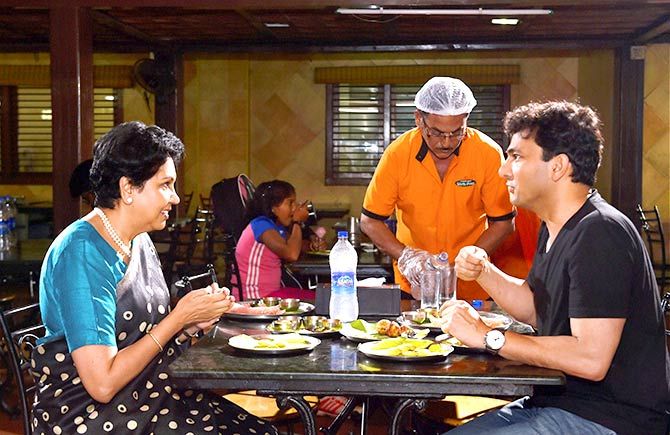The cola major expands its portfolio of healthy foods under brands Tropicana and Quaker Oats, looks to bring down its sugar addiction.

PepsiCo India is pushing its global health and nutrition agenda further in India with a set of new products crafted to suit the local palate.
Its move comes just a few months after global chairperson and CEO Indra Nooyi announced that the company would continue its commitment to transforming the food and beverage portfolio and work towards a more sustainable future.
With its new launches, the Indian arm of the cola giant is looking to keep its global promise without compromising on local tastes.
PepsiCo India has launched fortified fruit juices under Tropicana and breakfast variants under the Quaker Oats banner. While these products align the local operations with the corporation’s global promise, they are also geared to meet local tastes.
The company says it wants the brands to leverage global expertise and still stay relevant for local consumers.
Interestingly, the company has launched its juice label via e-commerce portals for the first one-and-a-half months.
PepsiCo says the new products signal the launch of new platforms that will eventually enhance the nutritional value of the company’s foods portfolio under Tropicana and Quaker Oats.
Currently, Tropicana and Quaker together contribute less than 20 percent to the complete PepsiCo business. With the launch of the new ranges, the company expects a growth of 2.5 to three per cent in the numbers this year.
“We call these platforms because currently we are launching a few products but, going further, there will be many more products under these two. We hope to make this a substantial business for PepsiCo in the next three to five years,” said Deepika Warrier, vice president nutrition category, India region.
The first platform is under the Tropicana brand, which the company says has so far stood for healthy taste.
Now it is looking at positioning the brand as an essential nutrition provider for rushed lifestyles. For this the company has launched a fruit and vegetable fortified juice under the label ,Tropicana Essentials.
Over time, the label will stand for a range of functionally fortified juices.
Tropicana Essentials will see four new products under its platform in the next 18 months.
“The logic is that we go out and identify what we call are the macro and micro nutrition deficiencies in India. We want to address these deficiencies in a tasty and convenient format with a juice,” said Warrier.
The company says that the World Health Organisation recommends five to six servings of fruits and vegetables each day. The average Indian gets just three and half, which reduces further as customers grow older.
This deficiency in the typical diet of most urban Indians leads to tiredness and other mood-related problems.
The company decided to exploit the online channel to reach out directly to consumers with their new offerings.
“E-commerce is the best way to go direct. It is a great platform to experiment on and get feedback very quickly. The data analytics are much better. Also, consumers here are the most experimental and (the medium lets) you go to the right consumers,” added Warrier, who has been with Pepsico for 17 years.
The second platform that the company has launched, Nutri Foods, is under the Quaker brand.
The company has planned to target popular breakfast cereals in India and fortify them with 40 to 60 per cent oats content.
“Take for example upma. When we make it at home, there is no wholegrain in it. With 50 to 60 per cent of oats in it, there are several benefits,” added Warrier. She says that, over the next few months, the brand will communicate its benefits in greater detail.
PepsiCo says that is objective for the Quaker brand was to use the winning formula it already had and tailor it to the taste preferences of local consumers. The idea is to offer options, “which are more nutritious and convenient and a quick power pack,” added Warrier.
It has launched oats dosas, idlis, upmas, khichdis in single-serve (Rs 15) and multi-serve packs (Rs 50).
Convenience, nutrition and variety are what customers want from their readymade foods according to industry experts. And the demand is only going to grow as consumers get more and more time-starved with rushed lifestyles.
“If you see the space, it is very tiny, the unpackaged to packaged ratio of the category (whole nutrition foods space) is just 25 per cent packaged. The room to convert from unpackaged and need for convenience is going to grow,” added Warrier.
Quaker has a huge market in south India, which explains its decision to start with breakfast variants that appeal more to southern consumers.
The company says it has seen a big change in the way consumers approach the foods segment in the time that it has spent in the country.
Apart from becoming more nutrition and convenience conscious, Warrier says, “There is a lot of awareness, a lot of do-it-yourself. Consumers look at labels, read the contents and look for advantages while at the same time want taste also.”
The changing attitudes of Indian consumers have led several brands to rethink their portfolios and communication strategies.
Competitors such as Britannia, MTR Foods among others have all changed their mandate to satisfy younger, on-the-go but healthy eaters, not just in the metros but also in the tier II and III towns.











